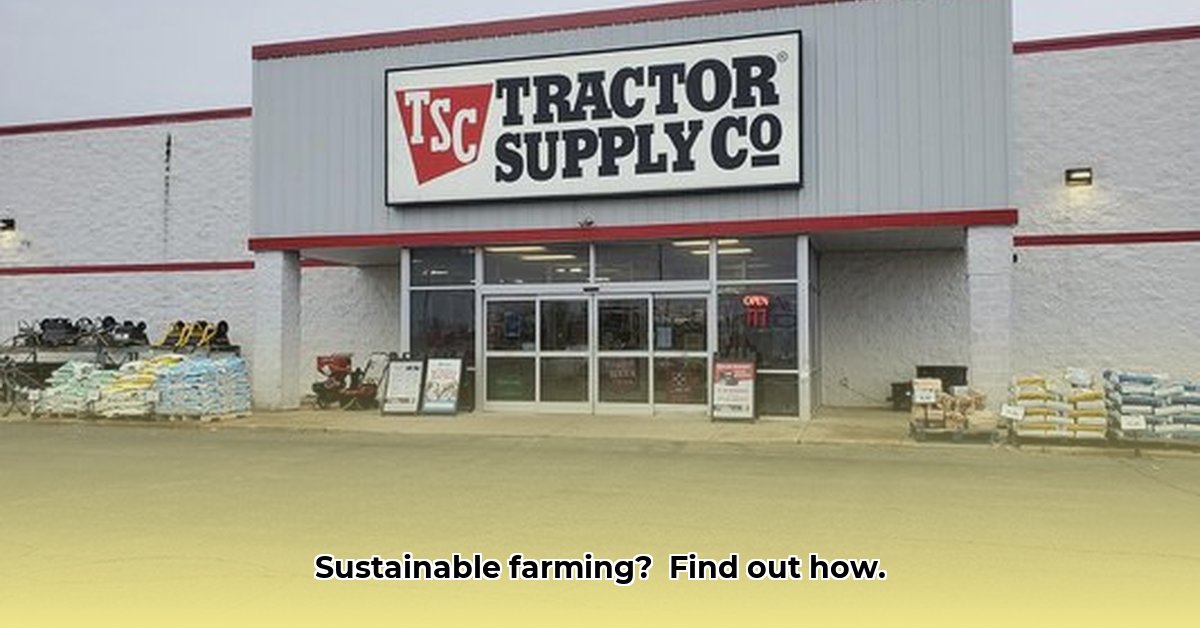
Richmond's newest Tractor Supply Co. (TSC) store isn't just another big-box retailer; it's emerging as a vital resource for local farmers committed to sustainable agriculture. This article explores how TSC is supporting these efforts, the eco-friendly products they offer, and how they compare to other local suppliers. We'll also provide actionable steps for gardeners and farmers to enhance their sustainable practices using TSC resources, ultimately showcasing how this retailer is contributing to a greener future for Richmond's agricultural community. For more information on sustainable options like equine bedding, check out this resource.
A Local Lifeline for Sustainable Farming
Imagine Sarah, a local farmer, previously facing a lengthy commute to acquire organic seeds for her small vegetable farm. This added travel time, expense, and environmental impact hindered her sustainability goals. Now, with the new Richmond TSC conveniently located, Sarah sources all her needs locally, highlighting the significant impact of readily available sustainable supplies. This accessibility empowers not just small-scale farmers but also backyard gardeners, strengthening Richmond's local food systems and reducing reliance on large-scale, potentially less environmentally friendly, agriculture. The reduced transportation needs directly contribute to a lower carbon footprint for local farmers, making it a win-win situation.
What's Next for Sustainable Agriculture in Richmond?
While the new Richmond TSC represents a positive step, a broader perspective is crucial. Currently, the store primarily focuses on traditional farming methods and materials. Cutting-edge technologies, like advanced irrigation systems or precision farming tools, are not yet extensively featured. Furthermore, transparency regarding the store's environmental impact—its supply chain, packaging, and energy consumption—could be improved. This lack of readily available information represents an area for growth. Ultimately, the store's success in promoting sustainable agriculture depends heavily on consumer choices.
How is Tractor Supply contributing to a sustainable future? The Richmond store’s role is significant, particularly for farmers and gardeners. But their success depends on expanding their own sustainability efforts.
Working Together for a Greener Future: Actionable Steps
How can we maximize the positive impact of the Richmond TSC on sustainable agriculture? The answer lies in a multi-faceted approach involving all stakeholders:
1. Tractor Supply's Role:
- Short-Term: Expand the range of eco-friendly products (organic fertilizers, natural pest control, biodegradable materials) and transparently communicate their environmental impact through published sustainability reports.
- Long-Term: Invest in research and collaborate with agricultural experts to offer cutting-edge sustainable farming technologies. Offer in-store workshops and educational materials on sustainable practices (e.g., composting, water conservation).
2. Local Farmers and Gardeners' Role:
- Short-Term: Utilize TSC's resources to support sustainable farming goals. Explore organic options and seek assistance from store staff.
- Long-Term: Advocate for policies promoting local food systems and sustainable agriculture at the local and state levels. Provide feedback to TSC on desired sustainable product additions.
3. Consumers' Role:
- Short-Term: Make conscious choices, prioritizing sustainable alternatives whenever possible. Read labels carefully and ask questions.
- Long-Term: Support local initiatives focused on sustainable agriculture and strengthening local food systems; consider buying directly from local farmers.
4. Local Government and NGOs' Role:
- Short-Term: Encourage TSC and other retailers to be more transparent about their sustainability efforts. Support research and development of sustainable farming technologies.
- Long-Term: Implement policies that incentivize sustainable farming practices (tax breaks, grants). Provide funding for educational programs that promote sustainable agriculture within the community.
This isn't about instant perfection; it's about consistent progress. By collaborating – retailers, growers, consumers, and local leaders – we can transform the Richmond TSC into a powerful engine for sustainable food production. The store's potential is vast, but realizing it requires collective action. Let's make it happen.
How to Find Eco-Friendly Farming Supplies at Tractor Supply
Key Takeaways:
- TSC offers a growing selection of eco-friendly farming supplies, but locating them requires a strategic approach.
- Consumer demand for sustainable options is increasing, creating opportunities for TSC and similar retailers.
Navigating the Green Aisles at TSC
Finding sustainable farming supplies at TSC isn’t always intuitive. It requires a planned approach. Their extensive product range can be overwhelming, making prior research crucial.
Strategic Shopping for Sustainable Farming
Follow these steps to maximize your efforts:
Online Research: Utilize TSC's website to explore their product catalog. Detailed product information and certifications (e.g., USDA Organic) are often available online, allowing for pre-selection.
Targeted Searches: Employ keywords like "organic," "natural," "sustainable," and "biodegradable" during online searches to filter results.
In-Store Exploration: Focus on the gardening and agricultural sections. Look for clearly marked organic or sustainably sourced products. Engage store staff for assistance locating specific items or brands.
Meticulous Label Examination: Scrutinize product labels for certifications, ingredient lists, and manufacturing processes to verify alignment with your sustainability criteria.
Understanding Market Trends
The rising demand for eco-friendly farming options is not a fleeting trend; it signifies growing consumer awareness and a preference for healthier, sustainable practices. Businesses like TSC that adapt and cater to this demand are well-positioned for success. TSC's future success depends on building relationships with organic farmers and suppliers, ensuring reliable access to high-quality, sustainable products. This focus will differentiate them in a competitive marketplace.